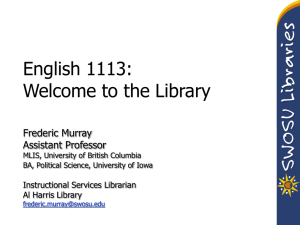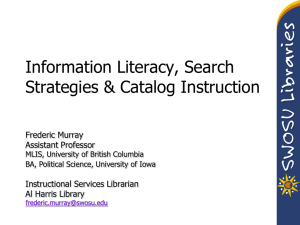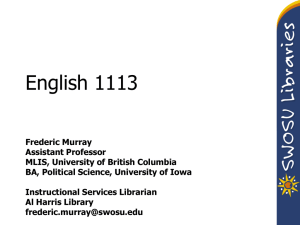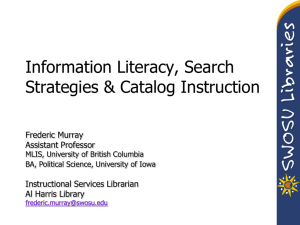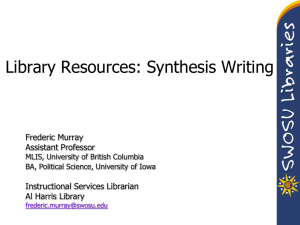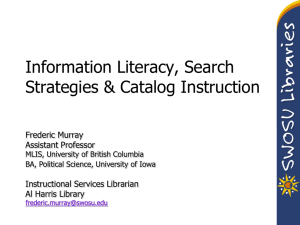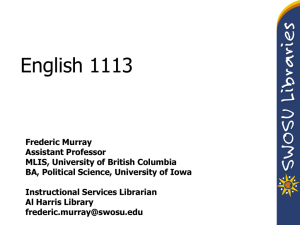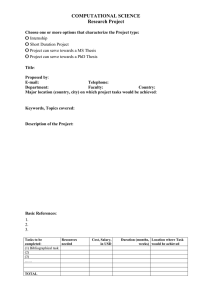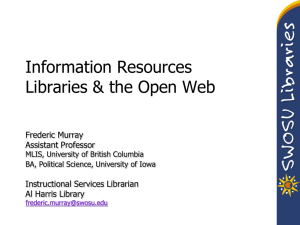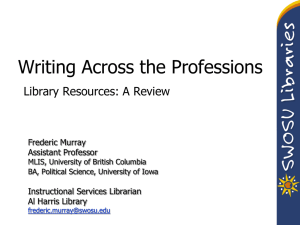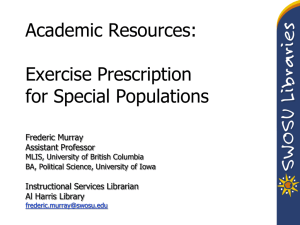Information Literacy Search Strategies & Catalog Session I Basics Frederic Murray
advertisement
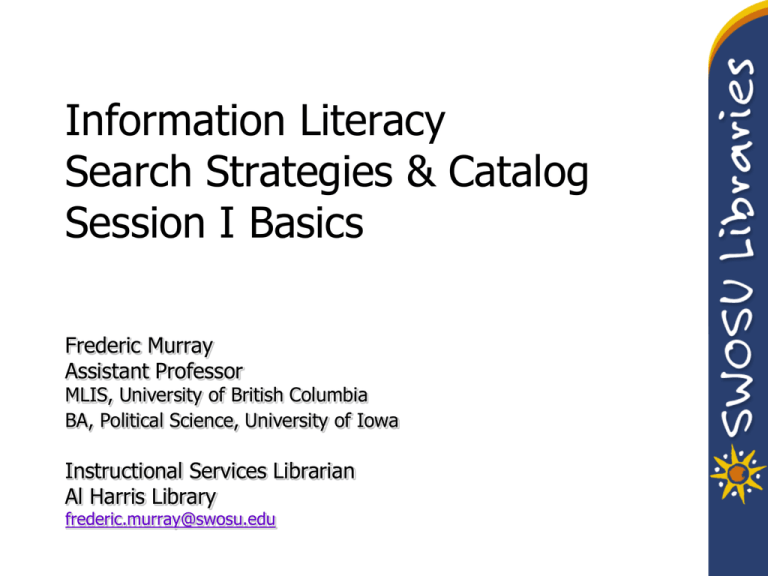
Information Literacy Search Strategies & Catalog Session I Basics Frederic Murray Assistant Professor MLIS, University of British Columbia BA, Political Science, University of Iowa Instructional Services Librarian Al Harris Library frederic.murray@swosu.edu Your SWOSU Student Outlook Password is your Library Login DID YOU KNOW What is the internet? Can the internet answer our questions? Fundamental Questions • Who am I? • What am I doing here? • Where am I going? DIKW • • • • Data Information Knowledge Wisdom D I K W Terms of Understanding • Data comes about through research, creation, gathering, and discovery. • Information has context. Data is turned into information by organizing it so that we can easily draw conclusions. Data is also turned into information by "presenting" it, such as making it visual or auditory. • Knowledge has the complexity of experience, which come about by seeing it from different perspectives. This is why training and education is difficult - one cannot count on one person's knowledge transferring to another. Knowledge is built from scratch by the learner through experience. Information is static, but knowledge is dynamic as it lives within us. • Wisdom is the ultimate level of understanding. As with knowledge, wisdom operates within us. We can share our experiences that create the building blocks for wisdom, however, it needs to be communicated with even more understanding of the personal contexts of our audience than with knowledge sharing. Cleveland H. "Information as Resource", The Futurist, December 1982 p. 34-39 How Satellite Photos Will Change Economics • The earth is quickly being encircled by hundreds of tiny satellites photographing economic activity Data-Information-Knowledge-Wisdom Planet Labs • San Francisco startup run by former NASA engineers • Largest imaging fleets aloft • Orbiting Earth every 90 minutes Spaceknow • San Francisco startup • Developing software to transform all these images into datasets • Track the worlds, trucks, ships, mines, warehouses. • DATA • INFORMATION Orbital Insight • Founder worked on Mars Rovers • Create a “macroscope” to track national & global trends • Create global poverty map • Predict illegal deforestation • Market intelligence for decision makers & investors KNOWLEDGE/WISDOM FRACKING List sources of information… Libraries • Common Sources of Information – Books – Newspapers – Journal Articles – Letters – Catalogs/Databases/Search Engines 21st Century • • • • • • • • • • • • • Video Podcasts Audio Podcast Wikis Blog (Weblog) and Video Blog Post Forum or Discussion Board Posting E-mail Computer Software/Downloaded Software Nonperiodical Web Document or Report Online Lecture Notes and Presentation Slides Qualitative Data and Online Interviews Graphic Data (e.g. Interactive Maps and Other Graphic Representations of Data) Data Sets Bibliographies • • • • • • • • • • • • • • Annotated Bibliographies Encyclopedias and Dictionaries Dissertation/Thesis from a Database Book Reviews Chapter/Section of a Web Document or Online Book Chapter Kindle Books Electronic Books Newspaper Article Abstract Article from a Database Article From an Online Periodical with no DOI Assigned Article From an Online Periodical with DOI Assigned Online Scholarly Journal Article: Citing DOIs Article From an Online Periodical 21st Century Catalogs, Databases, & Search Engines • A comprehensive list of the books, periodicals, maps, and other materials in a given collection. • A large, regularly updated file of digitized information related to a specific subject or field. • Computer software designed to help the user locate information available at sites on the World Wide Web by selecting categories from a hierarchical directory of subjects (example: Yahoo!) or by entering appropriate keywords or phrases (Google). Identifying Keywords • Identify the significant terms and concepts that describe your topic from your thesis statement or research question. • These terms will become the key for searching catalogs, databases and search engines for information about your subject. Thesis Statement Advances in digital communication have made online social networks an integral part of daily life. Thesis Statement Advances in digital communication have made online social networks an integral part of daily life. Communication and Online and Social Boolean • AND = Narrow • OR = Expand • NOT = Exclude Boolean Operators • Connect keywords only • Must be placed between keywords • AND – Narrows your search • OR – Expands your search with synonymous terms • NOT – Excludes words from your search – If used too much, it can work against you! Culture of the Book Culture of the Book • Extends the field of rationality • Encourages skepticism • Develops logical thinking E-Books: Ebrary/ eBooks • • • • • • 24/7 Chapter Results* Highlight Markup Note Taking Online Bookshelf Subject Hyperlinks* • Multiplicity of Use E-Books: Ebrary/ eBooks • • • • • • 24/7 Chapter Results* Highlight Markup Note Taking Online Bookshelf Subject Hyperlinks* • Multiplicity of Use Library Books Library Books: Catalog • Use Limiters to focus search – 2nd floor – Last 5 years – Videos Dewey • All of human knowledge is broken into Ten Major Categories Class Exercise • Using Keywords & Boolean create a search string on the assigned topic • Search the Catalog • Limit Results to 2nd floor • Using Dewey Call # locate book and bring back to class. Class Exercise • Locate an Ebrary book on the environmental aspects of fracking – Create an MLA Citation & Record on Worksheet • Locate a chapter result on this topic – Create an MLA Citation & Record on Worksheet Don't read to believe, read to question. Read. Read. Read. Just don't read one type of book. Read different books by various authors so that you develop different styles. - R. L. Stine The instruction we find in books is like fire. We fetch it from our neighbours, kindle it at home, communicate it to others, and it becomes the property of all. - Voltaire You don't have to burn books to destroy a culture. Just get people to stop reading them. - Ray Bradbury Questions? • Contact me: – Frederic Murray • 774-7113 • frederic.murray@swosu.edu Thanks!

